Question
Assume that Stratton & Briggs Engines Incorporated uses the aging approach to estimate bad debt expense at the end of each accounting year. Credit sales
Assume that Stratton & Briggs Engines Incorporated uses the aging approach to estimate bad debt expense at the end of each accounting year. Credit sales occur frequently on terms n/45. The balance of each account receivable is aged on the basis of four time periods as follows: (1) not yet due, (2) up to 6 months past due, (3) 6 to 12 months past due, and (4) more than 1 year past due. Experience has shown that for each age group, the average loss rate on the amount of the receivable at year-end due to uncollectibility is (a) 1 percent, (b) 5 percent, (c) 20 percent, and (d) 50 percent, respectively.
At December 31, 2022 (end of the current accounting year), the Accounts Receivable balance was $41,500 and the Allowance for Doubtful Accounts balance was $1,750 (credit). In determining which accounts have been paid, the company applies collections to the oldest sales first. To simplify, only five customer accounts are used; the details of each on December 31, 2022, follow:
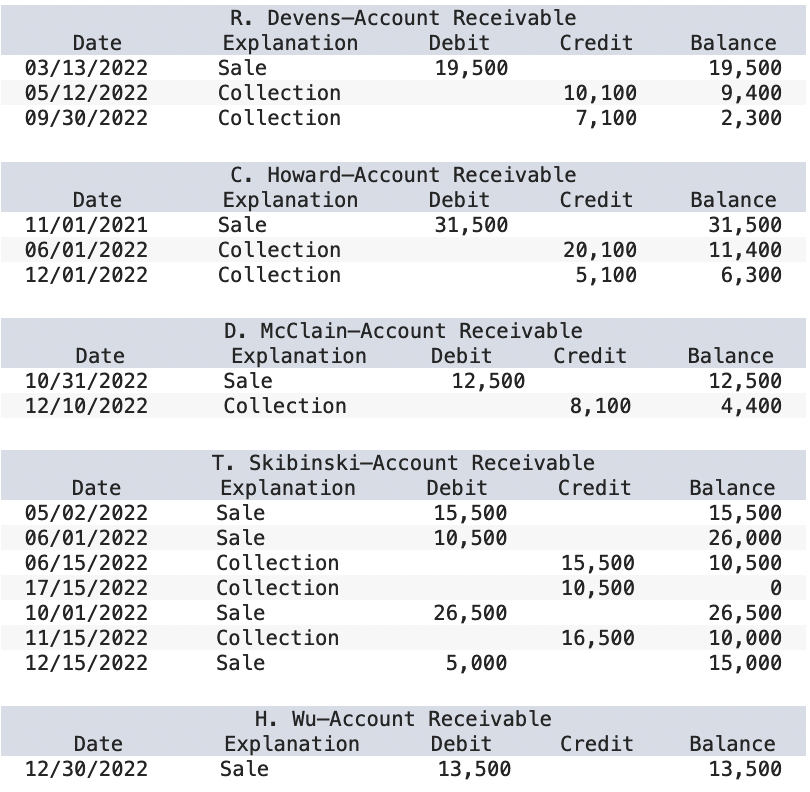
Required 1 Compute the total accounts receivable in each age category.
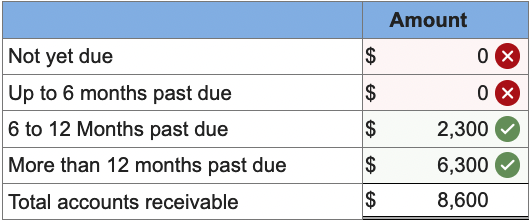
Required 2 Compute the estimated uncollectible amount for each age category and in total.
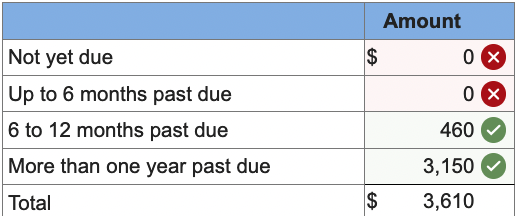
Required 3
Prepare the adjusting entry for bad debt expense at December 31, 2022. Note: If no entry is required for a transaction/event, select "No journal entry required" in the first account field.
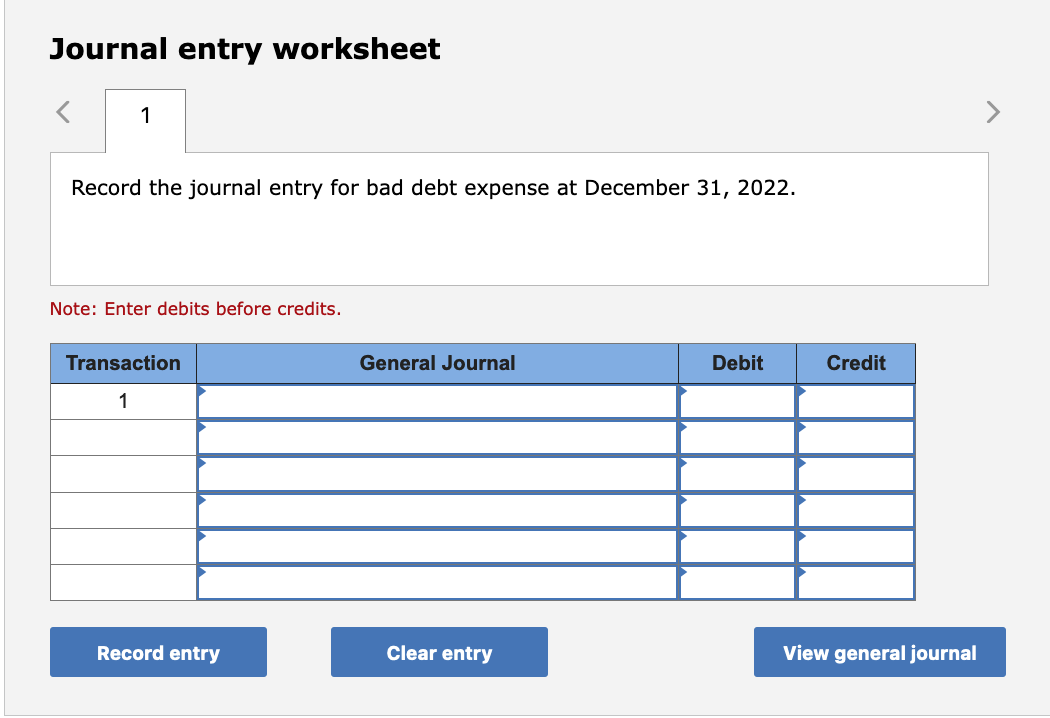
Required 4 Show how the amounts related to accounts receivable should be presented on the 2022 income statement and balance sheet.
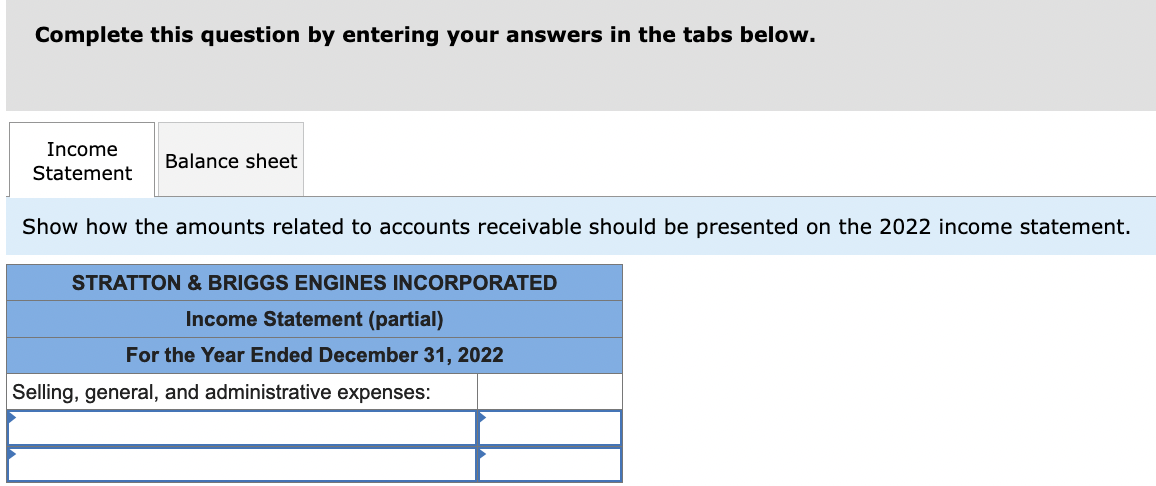
\begin{tabular}{clccr} & \multicolumn{2}{c}{ R. Devens-Account Receivable } & \\ Date & Explanation & Debit & Credit & Balance \\ \hline 03/13/2022 & Sale & 19,500 & & 19,500 \\ 05/12/2022 & Collection & & 10,100 & 9,400 \\ 09/30/2022 & Collection & & 7,100 & 2,300 \end{tabular} \begin{tabular}{clccr} \multicolumn{4}{c}{ C. Howard-Account Receivable } & \\ Date & Explanation & Debit & Credit & Balance \\ 11/01/2021 & Sale & 31,500 & & 31,500 \\ 06/01/2022 & Collection & & 20,100 & 11,400 \\ 12/01/2022 & Collection & & 5,100 & 6,300 \end{tabular} \begin{tabular}{clccr} & \multicolumn{2}{c}{ D. McClain-Account Receivable } & \\ Date & Explanation & Debit & Credit & Balance \\ \hline 10/31/2022 & Sale & 12,500 & & 12,500 \\ 12/10/2022 & Collection & & 8,100 & 4,400 \end{tabular} \begin{tabular}{|l|lc|} \hline & \multicolumn{2}{|c|}{ Amount } \\ \hline Not yet due & $ & 0 \\ \hline Up to 6 months past due & $ & 0 \\ \hline 6 to 12 Months past due & $ & 2,300 \\ \hline More than 12 months past due & $ & 6,300 \\ \hline Total accounts receivable & $ & 8,600 \\ \hline \end{tabular} Journal entry worksheet Record the journal entry for bad debt expense at December 31, 2022. Note: Enter debits before credits. Complete this question by entering your answers in the tabs below. Show how the amounts related to accounts receivable should be presented on the 2022 income statement. \begin{tabular}{clccr} & \multicolumn{2}{c}{ R. Devens-Account Receivable } & \\ Date & Explanation & Debit & Credit & Balance \\ \hline 03/13/2022 & Sale & 19,500 & & 19,500 \\ 05/12/2022 & Collection & & 10,100 & 9,400 \\ 09/30/2022 & Collection & & 7,100 & 2,300 \end{tabular} \begin{tabular}{clccr} \multicolumn{4}{c}{ C. Howard-Account Receivable } & \\ Date & Explanation & Debit & Credit & Balance \\ 11/01/2021 & Sale & 31,500 & & 31,500 \\ 06/01/2022 & Collection & & 20,100 & 11,400 \\ 12/01/2022 & Collection & & 5,100 & 6,300 \end{tabular} \begin{tabular}{clccr} & \multicolumn{2}{c}{ D. McClain-Account Receivable } & \\ Date & Explanation & Debit & Credit & Balance \\ \hline 10/31/2022 & Sale & 12,500 & & 12,500 \\ 12/10/2022 & Collection & & 8,100 & 4,400 \end{tabular} \begin{tabular}{|l|lc|} \hline & \multicolumn{2}{|c|}{ Amount } \\ \hline Not yet due & $ & 0 \\ \hline Up to 6 months past due & $ & 0 \\ \hline 6 to 12 Months past due & $ & 2,300 \\ \hline More than 12 months past due & $ & 6,300 \\ \hline Total accounts receivable & $ & 8,600 \\ \hline \end{tabular} Journal entry worksheet Record the journal entry for bad debt expense at December 31, 2022. Note: Enter debits before credits. Complete this question by entering your answers in the tabs below. Show how the amounts related to accounts receivable should be presented on the 2022 income statement
Step by Step Solution
There are 3 Steps involved in it
Step: 1

Get Instant Access to Expert-Tailored Solutions
See step-by-step solutions with expert insights and AI powered tools for academic success
Step: 2

Step: 3

Ace Your Homework with AI
Get the answers you need in no time with our AI-driven, step-by-step assistance
Get Started


